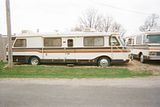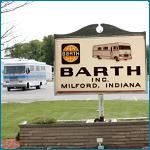Go to...  | Start A New Topic  | Search  | Notify  | Tools  | Reply To This Topic  |  |
 |
what is the differences between rv and marine injectors? _________________________ The 82 MCC {by Barth} is not an rv-- it is a Motor Coach!! | ||
|
"Host" of Barthmobile.com 1/19 1/19 |
Emissions...
| |||||||||||||||
| ||||||||||||||||
Also the size of the nozzles. '92 Barth Breakaway - 30' 5.9 Cummins (6B) 300+ HP 2000 Allison Front entrance | ||||
|
 |
what would be the advantage??? disadvantage?? ...besides higher HP?? _________________________ The 82 MCC {by Barth} is not an rv-- it is a Motor Coach!! | |||
|
Captain Doom |
More fuel=more power - if one has the means to get more air into the combustion chamber. I have high-pop (marine) injectors on my AMG engine (built by Peninsular Engines, which builds a lot of RV and marine engines). To take advantage of the extra fuel, I have a non-wastegated turbo. The stock engine produces 190 HP, with max boost of ~6 psi. Mine's 230 HP, max 17 psi. Rusty '94 28' Breakaway: MilSpec AMG 6.5L TD 230HP Nelson and Chester, not-spoiled Golden Retrievers Sometimes I think we're alone in the universe, and sometimes I think we're not. In either case the idea is quite staggering. - Arthur C. Clarke It was a woman who drove me to drink, and I've been searching thirty years to find her and thank her - W. C. Fields | |||
|
Of course that also means more heat coming out too. May have to upgrade/expand the cooling system. | ||||
|
FKA: noble97monarch 3/12 3/12 |
Although everything said previously is generically true, building HP from a motor (correct term is engine) is not a linear equation. There are many, many factors that conspire to make HP and torque. Any gear-head here will know this intuitively, but if you're not a gear-head be aware that it is not a simple thing to just bolt on HP in many cases. It is a slightly different equation for diesels versus gas too. In most engines the simplest HP gain is from increasing the "Flow" of air by freeing up intake and exhaust restrictions. Then, as Rusty stated, more fuel/air can increase power......unless the engine is designed really well from the factory (like a Ferrari or KTM motorcycle) and then you may actually lose HP! The two missing factors in the previous discussion IMHO are "efficiency" and "reliability". If you have a Cat 3208NA you may find that adding any HP is playing Russian roulette with reliability, whereas the Cummins 5.9 is known to handle much more than most engines were delivered with. Transmissions are critical because an engine is usually at is peak power (measured by torque) at only a small RPM band. The transmissions job is to keep the engine in that band no matter the speed. Generally the more gears in a transmission the better, but it needs to be matched the the torque range the motor produces to get proper efficiency and reliability. Too much fuel can affect the efficiency of the engine to burn the fuel efficiently and can result in raw fuel being simply pumped through without contributing to power (black smoke, flooding engine); too much air can make the engine "lean" and create hot spots which can damage the engine or cause pre-detonation where the hot spots ignite the fuel/air mixture prior to the most efficient moment based on correct timing. Then there is the age old problem of fuel management. The bigger the engine, the more fuel needed, but the harder it is to distribute it in the cylinder for high efficiency combustion. In gas engines you may see dual spark plugs added just to help the ignition be complete inside the combustion chamber, diesels are easier because the ambient pressure throughout the cylinder (that ignites the fuel) is equalized naturally. As top fuel racer Tony Schumacher (the Sarge) once told me when I questioned him about how they can build a race engine between runs in the outdoors with dust/dirt everywhere? He stated, "you want your engine to last 100,000 miles, I only need mine to go 1/4 mile , but very, very efficiently"!! Finally, you see adds state add 50 HP, add 25 HP; don't believe that this is always true for your engine. Plus, you can't just add things and then add up the HP claims and think you now produce that HP. People seem to claim all sorts of amazing HP gains without ever actually proving it. The only reliable way is to run a dyno pass off your rear wheels. Generally the claims are proven wildly optimistic. So my point is, be careful thinking you can just bolt on more HP. There are often unintended consequences. If it were easy, why didn't the factory just do it?  Formerly: 1997 Barth Monarch Now: 2000 BlueBird Wanderlodge 43' LXi Millennium Edition DD Series 60 500HP 3 stage Jake, Overbuilt bike lift with R1200GS BMW, followed by 2011 Jeep Wrangler Unlimited, “I haven’t been everywhere, but it’s on my list.” | |||
|
| Powered by Social Strata |
| Please Wait. Your request is being processed... |
|
This website is dedicated to the Barth Custom Coach, their owners and those who admire this American made, quality crafted, motor coach.
We are committed to the history, preservation and restoration of the Barth Custom Coach.
We are committed to the history, preservation and restoration of the Barth Custom Coach.



